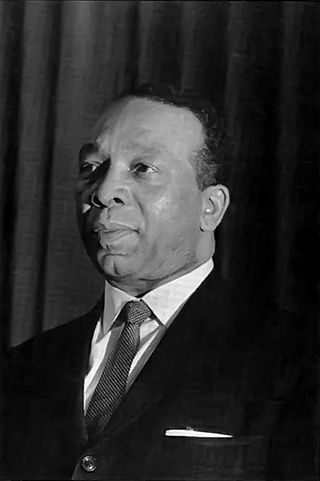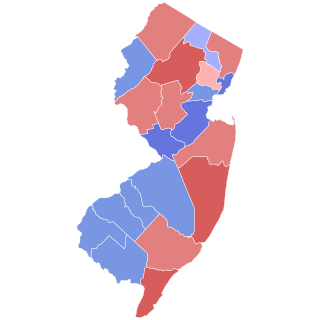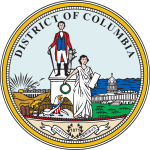
Presidential elections were held in the United States on November 6, 1984. Incumbent Republican President Ronald Reagan and his running mate, incumbent Vice President George H. W. Bush, were reelected to a second term in a landslide. They defeated the Democratic ticket of former Vice President Walter Mondale and Congresswoman Geraldine Ferraro.

Walter Edward Washington was an American civil servant and politician. After a career in public housing, Washington was the chief executive of the District of Columbia from 1967 to 1979, serving as the first and only Mayor-Commissioner of the District of Columbia from 1967 to 1974, and as the first Mayor of the District of Columbia from 1975 to 1979.

The 1978 United States Senate elections were held on November 7, in the middle of Democratic President Jimmy Carter's term. The 33 seats of Class 2 were contested in regular elections. Special elections were also held to fill vacancies.

The 1974 United States Senate elections were held on November 5, with the 34 seats of Class 3 contested in regular elections. They occurred in the wake of the Watergate scandal, Richard M. Nixon's resignation from the presidency, and Gerald Ford's subsequent pardon of Nixon. Economic issues, specifically inflation and stagnation, were also a factor that contributed to Republican losses. As an immediate result of the November 1974 elections, Democrats made a net gain of three seats from the Republicans, as they defeated Republican incumbents in Colorado and Kentucky and picked up open seats in Florida and Vermont, while Republicans won the open seat in Nevada. Following the elections, at the beginning of the 94th U.S. Congress, the Democratic caucus controlled 60 seats, and the Republican caucus controlled 38 seats.

The 1972 United States Senate elections were held on November 7, with the 33 seats of Class 2 contested in regular elections. They coincided with the landslide re-election of Republican President Richard Nixon. Despite Nixon's landslide victory, Democrats increased their majority by two seats. The Democrats picked up open seats in Kentucky and South Dakota, and defeated four incumbent senators: Gordon Allott of Colorado, J. Caleb Boggs of Delaware, Jack Miller of Iowa, and Margaret Chase Smith of Maine. The Republicans picked up open seats in New Mexico, North Carolina, and Oklahoma, and defeated one incumbent, William B. Spong Jr. of Virginia.

Carol Schwartz is an American politician and Perennial candidate from Washington, D.C., who served as a Republican at-large member on the Council of the District of Columbia from 1985 to 1989 and again from 1997 to 2009. A five-time perennial candidate for mayor, she is the only Republican nominee since the restoration of home rule to garner more than 30 percent of the vote. She announced her fifth campaign for mayor on June 9, 2014 finishing behind Muriel Bowser and David Catania. In 2015, she was appointed to the D.C. Board of Ethics and Government Accountability by Mayor Muriel Bowser.

The United States Senate election of 1978 in Massachusetts was held on November 7, 1978, with the incumbent Republican Senator Edward Brooke being defeated by Democratic Congressman Paul Tsongas.

Yvette M. Alexander is a Democratic politician in Washington, D.C. She represented Ward 7 on the Council of the District of Columbia from 2007 to 2017.

On November 7, 1978, Washington, D.C., held the second election for its mayor as a result of the District of Columbia Home Rule Act. The primary election of the Democratic Party took place on Tuesday, September 12, with At-Large Councilman Marion Barry defeating incumbent mayor Walter E. Washington and Council Chair Sterling Tucker to become the Democratic nominee for Mayor. Barry defeated Republican nominee Arthur Fletcher and two marginal candidates in the general election on November 7, 1978.

On November 2, 2010, Washington, D.C., held an election for its mayor. The primary elections occurred on September 14. Vincent Gray won the general election by a wide margin, although many voters wrote in incumbent Mayor Adrian Fenty, whom Gray defeated in the primary.

The 2018 United States elections were held on Tuesday, November 6, 2018. These midterm elections occurred during Incumbent Republican President Donald Trump's first term. Although the Republican Party increased its majority in the Senate, unified Republican control of Congress and the White House was brought to an end when the Democratic Party won control of the House of Representatives in what was widely characterized as a "blue wave" election as Democrats also gained governorships, other statewide offices, and state legislative chambers.

The Chicago mayoral election of 1983 began with the primary on February 22, 1983, which was followed by the general on April 12, 1983. The election saw the election of Chicago's first African-American mayor, Harold Washington.

The 1951 Philadelphia municipal election, held on Tuesday, November 6, was the first election under the city's new charter, which had been approved by the voters in April, and the first Democratic victory in the city in more than a half-century. The positions contested were those of mayor and district attorney, and all seventeen city council seats. There was also a referendum on whether to consolidate the city and county governments. Citywide, the Democrats took majorities of over 100,000 votes, breaking a 67-year Republican hold on city government. Joseph S. Clark Jr. and Richardson Dilworth, two of the main movers for the charter reform, were elected mayor and district attorney, respectively. Led by local party chairman James A. Finnegan, the Democrats also took fourteen of seventeen city council seats, and all of the citywide offices on the ballot. A referendum on city-county consolidation passed by a wide margin. The election marked the beginning of Democratic dominance of Philadelphia city politics, which continues today.

The 1957 Philadelphia municipal election, held on November 5, involved the election of the district attorney, city controller, and the remainder of a term for one city council seat, as well as several row offices and judgeships. Democrats were successful citywide, continuing a run of victories racked up after the passage of a new city charter in 1951 despite growing divisions between factions of the party. Victor H. Blanc, the incumbent district attorney, led the Democratic ticket to victory. They held the city council seat and took two citywide offices that Republicans had won in 1953. In the judges' elections, most were endorsed by both parties but in the one race that pitted a Democratic candidate against a Republican, the Democrats were successful in seating their candidate, former Congressman Earl Chudoff.

1959 Philadelphia's municipal election, held on November 3, involved contests for mayor, all seventeen city council seats, and several other executive and judicial offices. Citywide, the Democrats took majorities of over 200,000 votes, continuing their success from the elections four years earlier. Richardson Dilworth, who had been elected mayor in 1955, was re-elected over Republican nominee Harold Stassen. The Democrats also took fifteen of seventeen city council seats, the most seats allowed to any one party under the 1951 city charter. They further kept control of the other citywide offices. The election represented a continued consolidation of control by the Democrats after their citywide victories of the previous eight years.

Calvin H. Gurley is an accountant and perennial candidate living in Washington, D.C.

The 1963 Philadelphia's municipal election, held on November 5, involved contests for mayor, all seventeen city council seats, and several other executive and judicial offices. The Democrats lost vote share citywide and the Republicans gained one seat in City Council, but the Democratic acting mayor, James Tate, was elected to a full term and his party maintained their hold on the city government. The election was the first decline in the Democrats' share of the vote since they took control of the city government in the 1951 elections, and showed the growing tension between the reformers and ward bosses within their party.

The 1958 United States Senate election in New Jersey was held on November 4, 1958.

Elections are currently held every four years to elect the mayor of Hartford, Connecticut.

On November 8, 2022, a general election was held for the Council of the District of Columbia. Elections were held in four ward districts as well as for chairperson of the council and two at-large seats. Democrats remained in control of the council, electing six out of the seven positions that were on the ballot. Independent Kenyan McDuffin, formerly the Democratic councilperson for Ward 5, was also elected.



















